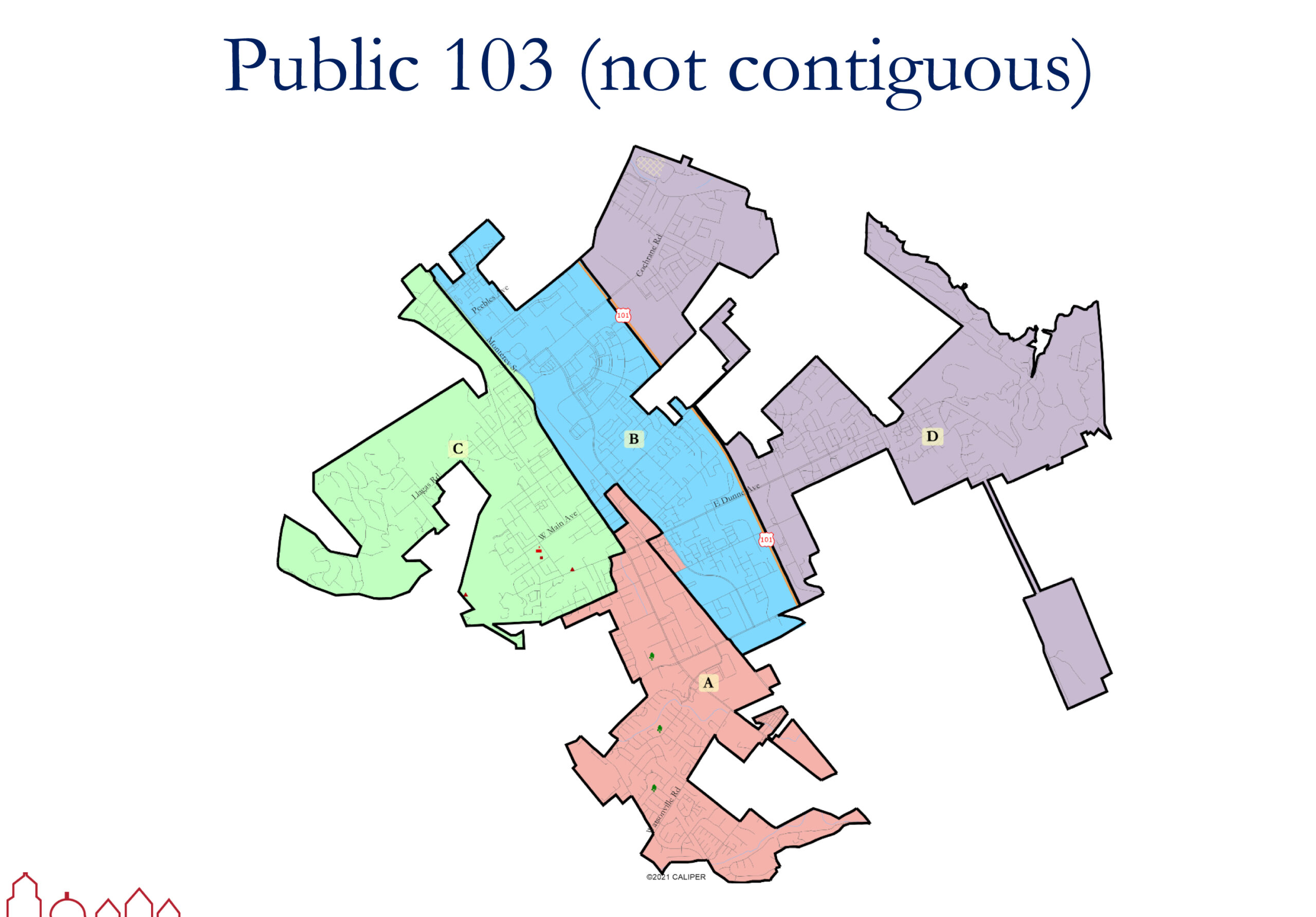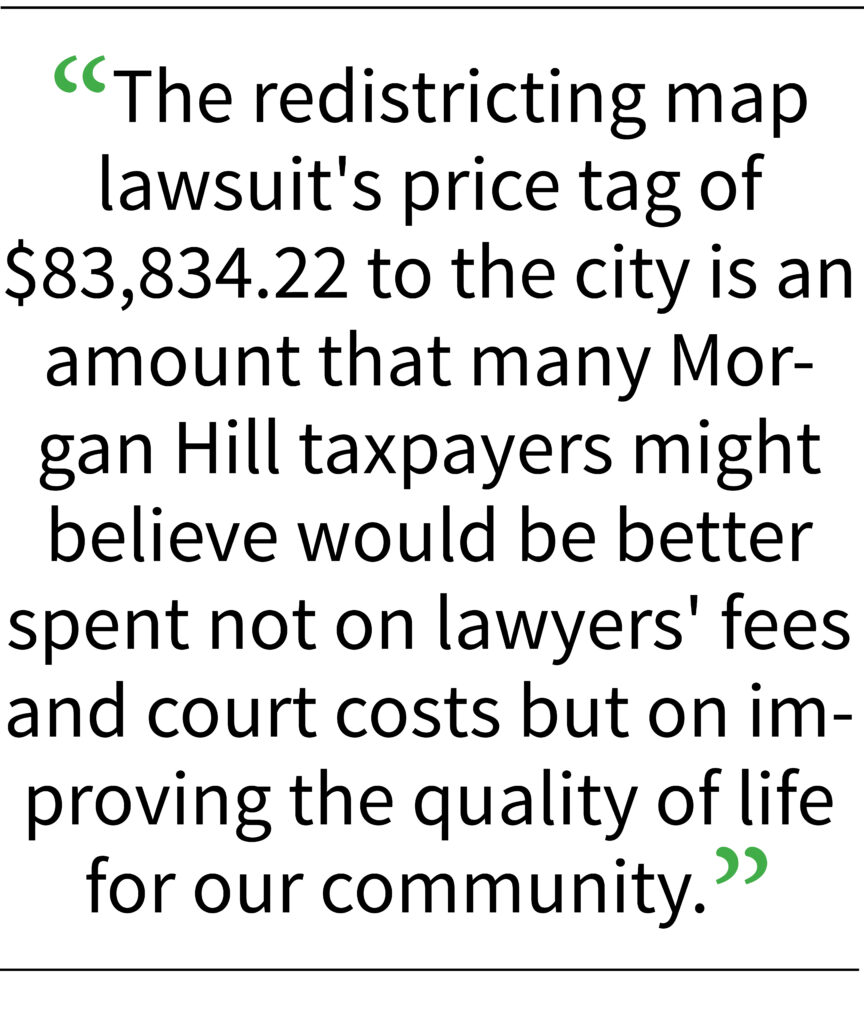If the pros alert elected officials the city might be sued, it’s prudent to listen judiciously to their qualified wisdom.

This editorial is the opinion of Morgan Hill Life
The cost to Morgan Hill taxpayers was recently tallied for the city’s loss of a lawsuit over a redistricting map decision made by the city council. Their vote was found to violate state election law.
 According to Morgan Hill City Clerk Michelle Bigelow, the cost breakdown is as follows:
According to Morgan Hill City Clerk Michelle Bigelow, the cost breakdown is as follows:
Cost of Defense: $25,350.00 (The lawyers Armando Benavides and Morris Baller worked pro bono. The amount paid was for associate and paralegal time.)
Plaintiffs’ Attorney Fees: $39,384.22. (Lawyer Christopher Skinnell’s payment for his work on the lawsuit.)
Outside counsel: $7,850 (These are the fees paid to Gary Baum for his time at a city council meeting and other duties because City Attorney Don Larkin was conflicted out.)
National Demographics Corporation: $2,500
Second Opinion and Litigation Advice: $8,750
Total: $83,834.22
Let’s consider the path to how our community arrived at this point.
The city council members received multiple warnings by Larkin as well as a team of demographics consultants who drew some of the various map options (professionals who received a total of $31,500 for their services). The experts told the officials that, according to California’s Fair Maps Act, redistricting Map 103 was illegal and might result in a lawsuit. At the March 2 meeting, however, Mayor Rich Constantine and councilmembers Rene Spring (District C) and Yvonne Martínez Beltrán (District B) voted in the majority for the disputed Map 103. Councilmembers John McKay (District D) and Gino Borgioli (District A) favored the map designated as NDC Green Map.
 Constantine explained his tie-breaking vote in favor of the illegal map as an attempt to avoid a lawsuit from Armando Benavides. The local attorney threatened to sue the city if the council failed to vote for Map 103. He falsely told them the other maps did not fairly represent the Latino community of interest.
Constantine explained his tie-breaking vote in favor of the illegal map as an attempt to avoid a lawsuit from Armando Benavides. The local attorney threatened to sue the city if the council failed to vote for Map 103. He falsely told them the other maps did not fairly represent the Latino community of interest.
City councilmembers received a March 23-dated letter from the law firm Nielsen Merksamer signed by lawyer Christopher Skinnell demanding the city council reconsider the adoption of redistricting Map 103.
At the April 6 city council meeting, at the request of Mayor Constantine, the council received an opportunity to reconsider their original vote. They voted exactly as they did as at the March 2 meeting. The Latino communities of interest were the driving factor for Constantine, Spring and Martínez Beltrán’s vote for Map 103. Demographers, however, had explained to the council that Map 103 and the NDC Green Map essentially provided an equality of representation for that group, with the statistics of Latino voter numbers of each map being almost identical and within the statistical margin of error.
A few days later, a lawsuit was brought against the city by former Mayor Steve Tate and Morgan Hill residents Swanee Edwards, Brian and Kathy Sullivan, with Skinnell representing the group. Larkin recused himself in defending the city due to the Rules of Professional Conduct for Attorneys. It would be inappropriate because he had argued against the selection of Map 103. The city hired Benavides to represent it in the lawsuit. The family law attorney had no previous court experience in California Election Code law.
On May 9 at a hearing that lasted less than one hour, Superior Court Judge Julie A. Emede ruled Map 103 violates the California Fair Maps Act’s requirement to apply contiguity as spelled out in the Elections Code. Specifically, the court found District D on the east side of Morgan Hill is not contiguous as it was segregated into two sections.
The city council voted 4-0 at the May 18 meeting to adopt the district map NDC Green, which had been suggested for approval by a minority of council members at previous meetings. Councilmember Spring abstained from the vote in “protest.”
The redistricting map lawsuit’s price tag of $83,834.22 to the city is an amount of money many Morgan Hill taxpayers might believe would be better spent not on lawyers’ fees and court costs but on the quality of life for our community’s residents. This is especially true during a time when the city cannot afford the “luxury” of a lawsuit that could have been easily avoided if the city council had only done the right thing.
The lawsuit outcome provides our elected leaders valuable lessons. Among them: take heed the words of warnings given by those who have spent years gaining legal expertise in complex questions of law. If the pros alert elected officials the city might be sued, it’s prudent to listen judiciously to their qualified wisdom.






